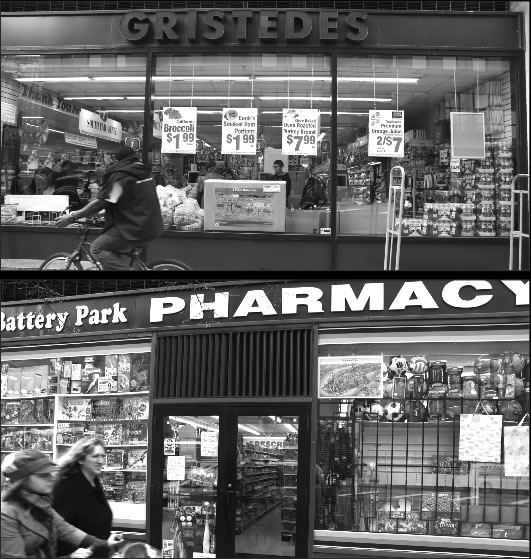By Julie Shapiro
New regulations could be coming to Battery Park City, and many business owners and residents are unhappy.
The Battery Park City Authority wants to make storefronts more uniform by limiting the signs in windows and banning stanchions on the sidewalk. The proposed regulations, which are not yet in effect, would call for a $500-per-week penalty for each unapproved sign.
John Catsimatidis, owner of the Gristedes chain of supermarkets, said the new rules would hurt his two Battery Park City stores.
“In tough economic times, government or quasi-government authorities should help promote business, not try to discourage it or hurt it,” Catsimatidis said in a phone interview. “Maybe the Battery Park City people don’t have enough to do and sit around thinking up new regulations.”
Leticia Remauro, spokesperson for the B.P.C.A., said the authority regularly receives complaints from people who dislike window signs or trip over sandwich-board signs on the sidewalk. She called the current mishmash of signs in store windows “hectic, erratic and unsightly.”
“The idea is to reduce the visual clutter,” Remauro told Community Board 1’s B.P.C. Committee last week.
The authority’s current design guidelines for buildings and parks have already molded Battery Park City into one of the most uniform, suburban-looking neighborhoods of the city. The authority would now apply those design guidelines to storefronts, following the example of towns in Westchester and on Long Island.
Jeff Galloway, co-chairperson of C.B. 1’s B.P.C. Committee, said he saw no problem with the way stores currently look and called the authority’s proposal a “Disneyfication” of the neighborhood.
“I don’t choose to live in a mall,” Galloway said. “I like the small-town flavor. I like the flyers.”
Anthony Notaro, another B.P.C. resident, said neighborhood businesses already face a barrage of regulations and tickets.
“It just seems like one more thing on top of small business people,” Notaro said. “Less regulation is often better.”
The Governor’s Office of Regulatory Reform would have to approve the new rules, a process that will take at least until the middle of August, after several public comment periods. Parks Enforcement Patrol officers would enforce the rules.
If the new rules go into effect, Remauro said the authority would use a “liberal appeals process” to work with businesses that want to have signs in their windows. Filing for a variance would cost $100 per sign or display.
The regulations would allow only one sign per window, and that sign could only have the business’s name and logo, not any promotions. The regulations would also prohibit merchandise stacked or stored in the window.
The authority sent a letter to all B.P.C. businesses in February outlining the proposed regulations, and some businesses have already complied voluntarily because of the threat of steep fines.
The Gateway Plaza Gristedes recently removed some of its large posters and replaced them with smaller ones advertising that week’s sales, but the signs in the windows still would not comply. Catsimatidis was not sure whether the smaller signs were a response to the authority’s regulations or a coincidence.
Patl Sunny, who works at Cafe Express on South End Ave., said he removed all the posters from his windows after getting a second letter from the Battery Park City Authority. The signs, which showed brimming cups of iced coffee and toasted paninis, are now plastered over the walls of the store, mostly invisible from the street.
The cafe’s business has dropped over the past few months, “But I can’t say if it’s because of the signs,” Sunny said. “People are losing their jobs left and right.”
Customers from the neighborhood still frequent the cafe, but Sunny thinks tourists are less likely to come in now that the posters are gone from the windows.
If the Battery Park City Authority wants to help businesses, Sunny suggested they devote their time to hosing down the sidewalks instead, especially to clean dog excrement.
Sandy Kraehling, owner of the Pan Latin Cafe, uses the space near her windows to store boxes of food and supplies, which would go against the new rules. After hearing from the authority, she installed curtains to hide the boxes from view.
Kraehling, who recently founded the B.P.C. Retailers Association, does not object to the proposed rules, because they help motivate her employees to keep the store neat, but she said the letter caused panic among many businesses owners.
Michael Sims Jr., manager at Terry’s deli, said the $500 penalty fee would be excessive. He often stacks pickles and other items in his window and is not sure whether the new rules would prohibit that.
“We would have to do some pretty big changes,” Sims said. “They recommended putting up curtain, which I think would be less appealing than a display.”
Without displays in the windows, people passing by “would have less of an idea of what we’re about,” Sims said.
Kraehling and several residents also worry that the new restrictions would make the neighborhood lose its color.
“Personality and flavor is a subjective thing,” Kraehling said.
Julie@DowntownExpress.com


































